ANIMALS
Zookeeper’s Final Goodbye Kiss from Giraffe Leaves Viewers Heartbroken
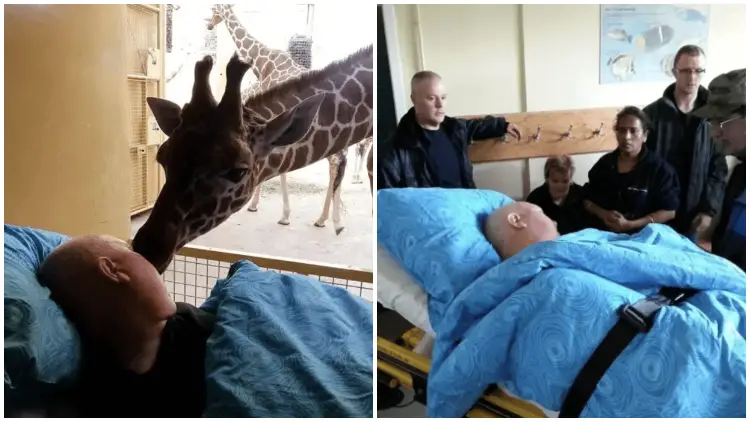
Despite his serious medical conditions, Mario’s love for the animals he cared for as a zookeeper remained steadfast for 25 years. The giraffes, in particular, held a special place in his heart. As he approached the end of his life, a touching farewell was shared between Mario and one of the giraffes he had dedicated his life to caring for at a Dutch zoo, leaving observers with tears in their eyes.
 Image source: Diergaarde Blijdorp / Rotterdam Zoo
Image source: Diergaarde Blijdorp / Rotterdam Zoo
At 54 years old and on his deathbed, Mario made a final wish to be taken into the giraffe enclosure at Rotterdam’s Diergaarde Blijdorp Zoo where he had worked for many years. Much to the surprise of everyone present, one of the giraffes approached Mario as he lay there. The heartwarming moment was captured as the giraffe gave Mario gentle kisses, with the other giraffes following suit, sensing that Mario was unwell and wanting to offer comfort.
 Image source: Diergaarde Blijdorp / Rotterdam Zoo
Image source: Diergaarde Blijdorp / Rotterdam Zoo
Mario’s last wish to spend his final moments in the zoo with the animals he had cared for all his life was granted by the Ambulance Wish Foundation. The foundation organized the touching reunion as a fitting tribute to the dedicated zookeeper and as a reminder of the powerful connection between humans and animals. The Ambulance Wish Foundation relies on the generosity of volunteers and donors to help fulfill the last wishes of people like Mario who are fighting illness.
“You could see him totally light up,” Kees Veldboer – founder and director of Ambulance Wish Foundation, told Rotterdam newspaper Algemeen Dagblad. “It’s so special to see that those animals recognize him, and a sense that he isn’t doing well…a very special moment. You saw him beaming.”
 Image source: Diergaarde Blijdorp / Rotterdam Zoo
Image source: Diergaarde Blijdorp / Rotterdam Zoo
There have been numerous research studies demonstrating that animals possess an extraordinary ability to detect illness and disease in humans, even in the absence of noticeable symptoms. The giraffes that showed affection towards Mario, their caretaker, are a prime example of how animals can display love and compassion towards their perceived family members, regardless of species. It’s a testament to the concept of karma – what you give to the world comes back to you in ways you may not expect.
Watch the Video here:
ANIMALS
Amazing Video of Unseen Ocean Creatures in the Ningaloo Canyons

The Schmidt Ocean Institute recently explored the Ningaloo Canyons on the western coast of Australia using a robotic underwater vehicle called the ROV Sebastian. Check out the amazing video of what they discovered in the deep parts of the Indian Ocean.
More info: Youtube




ANIMALS
These Pics Are Art and the Artists Are Insects

Flying insects move so quickly that they are hard to follow, but new technology and some smart ideas have helped Spanish photographer Xavi Bou do just that. After spending 10 years focusing on birds in flight for his Ornithographies project, he turned his attention to insects.
For Entomographies, he uses high-speed video footage taken by Adrian Smith, an insect expert at North Carolina State University, to study and record how insects move. Bou then picks multiple frames and combines them into single images that show the fast movements of one or more insects through space and time.
With Smith’s help, Bou has captured the aerial tricks of wasps, the jumps of leafhoppers, and the fluttering of butterflies in amazing detail. He hopes that by doing this, he can make people more aware of the decline in important insect populations around the world.
1. Zebra longwing
This butterfly, which is common in many areas of the Americas, really fits its name. It can fly very high with just a few flaps of its large wings.
 Image source: nationalgeographic
Image source: nationalgeographic
2. Two-lined spittlebug
This insect, which comes from the eastern United States, is often seen as a pest because it likes to eat grass. Its springy back legs can make it jump into the air like a rocket.
 Image source: nationalgeographic
Image source: nationalgeographic
3. Yellow-collared scape moth
Unlike most moths, this North American species flies during the day. Its shiny blue-black wings sparkle in the sunlight.
 Image source: nationalgeographic
Image source: nationalgeographic
4. Ailanthus webworm moths
These tropical moths have spread farther north in the U.S. Because of their larval host, the invasive tree of heaven, they are now one of the most common backyard moths in the country.
 Image source: nationalgeographic
Image source: nationalgeographic
5. Common stonefly
Mostly found in eastern North America, this insect starts its life as an underwater nymph in forested streams or rivers. Then it leaves the water, sheds its skin, and becomes an adult with wings.
 Image source: nationalgeographic
Image source: nationalgeographic
6. Green lacewings
Eighty-seven species of this insect have been found in the U.S. and Canada. Since they eat a lot of unwanted plant pests like aphids and mites, they are often used to naturally control these pests.
 Image source: nationalgeographic
Image source: nationalgeographic
7. Grapevine beetle
This insect, fittingly named, eats the leaves and fruit of grapevines, both wild and farmed, but it doesn’t do much damage to the plants. As a type of scarab beetle, it often flies in a curved path.
 Image source: nationalgeographic
Image source: nationalgeographic
8. Oak treehopper and green treehopper
Treehoppers are known for their uniquely shaped pronotum, the part behind their head, which often looks like plant parts to hide from predators. They can jump well thanks to special muscles.
 Image source: nationalgeographic
Image source: nationalgeographic
9. Banded orange
This brightly colored butterfly can be found from Mexico to Brazil. Before mating season, male butterflies look for mineral salts, sometimes even drinking salty fluids from the skin, eyes, and nostrils of other animals.
 Image source: nationalgeographic
Image source: nationalgeographic
10. Sapho longwing
Longwings can live for 6 to 7 months, longer than most butterflies. This type, found from Mexico to Ecuador, has shiny blue wings, which is why it’s also called the Sapphire longwing.
 Image source: nationalgeographic
Image source: nationalgeographic
ANIMALS
Eagle and Fox in an Epic Midair Battle Over a Rabbit, Were Captured by a Photographer

Wildlife photography often depends on the perfect combination of good timing and the right place.
That’s exactly what happened when Kevin Ebi, an experienced wildlife photographer, captured an incredible battle between a bald eagle and a red fox, both competing for a rabbit meal.
In a detailed blog post, Ebi shares the fascinating series of events that unfolded while he was photographing foxes in San Juan Island National Historical Park, located in Washington state.
Ebi noticed a lively group of eight fox kits as they began their hunting lessons. Suddenly, they spotted a rabbit, and a thrilling chase ensued. Eventually, one of the foxes emerged as the winner, proudly carrying the rabbit across the field.
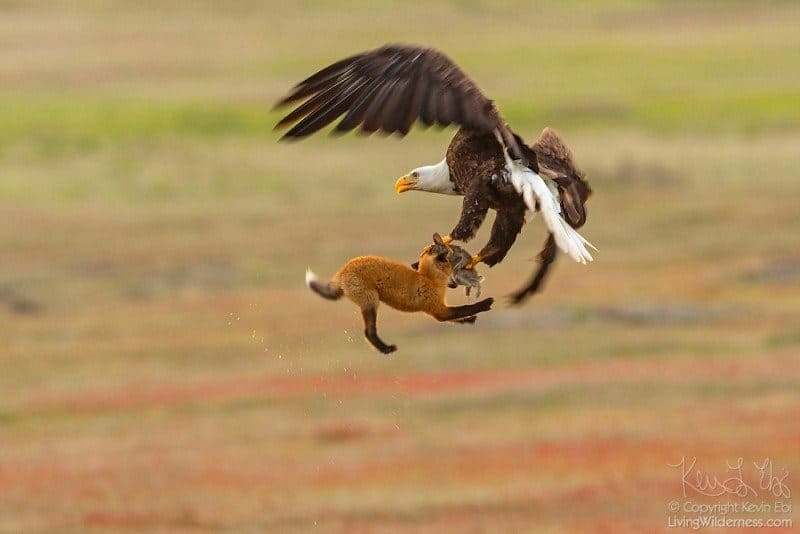 Image source: Kevin Ebi
Image source: Kevin Ebi
Ebi shares what happened at that moment: “As I followed the fox with my camera, a sudden bald eagle cry caught my attention. It was swiftly approaching, clearly aiming for the rabbit. I quickly focused on the fox, anticipating a quick turnover of events.”
To Ebi’s astonishment, instead of a quick surrender, the situation turned into a intense fight in the air.
The eagle used its power to lift the fox and rabbit high up in the sky. Even while airborne, the fox attempted to break free by swinging back and forth.
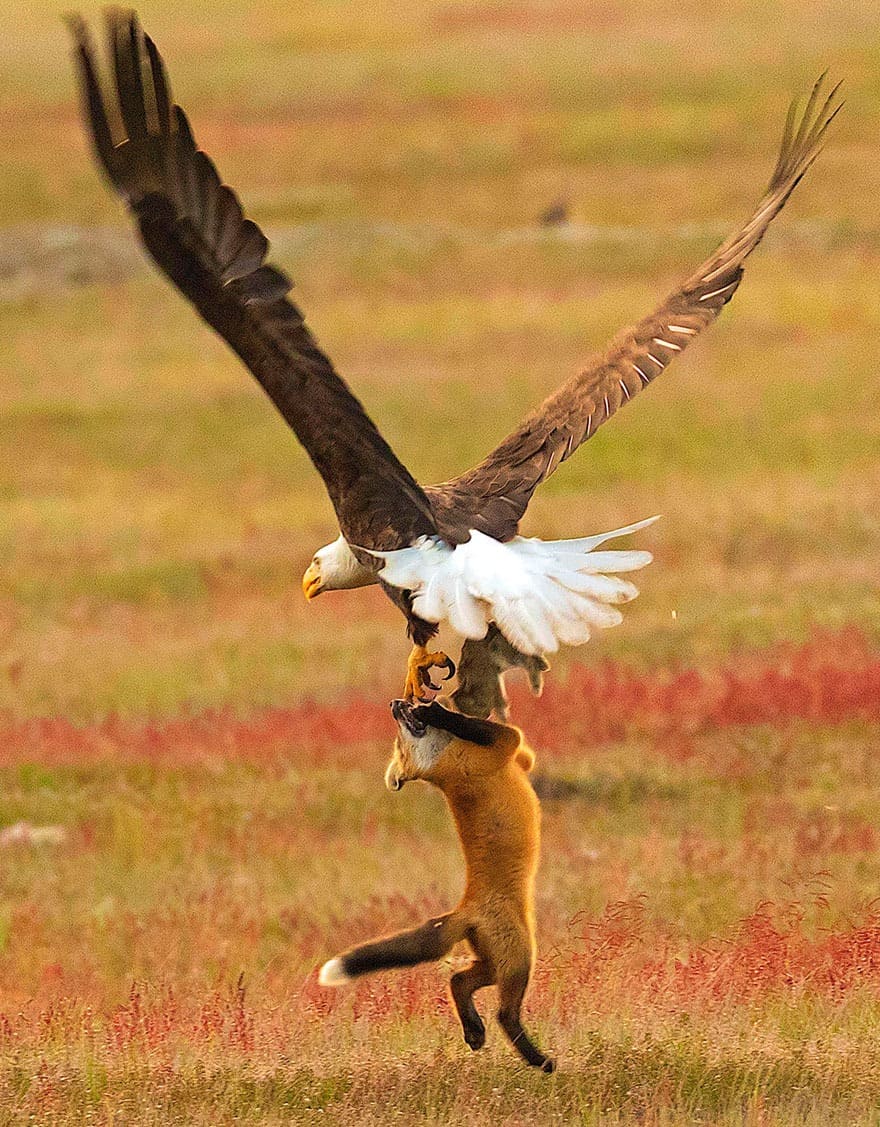 Image source: Kevin Ebi
Image source: Kevin Ebi
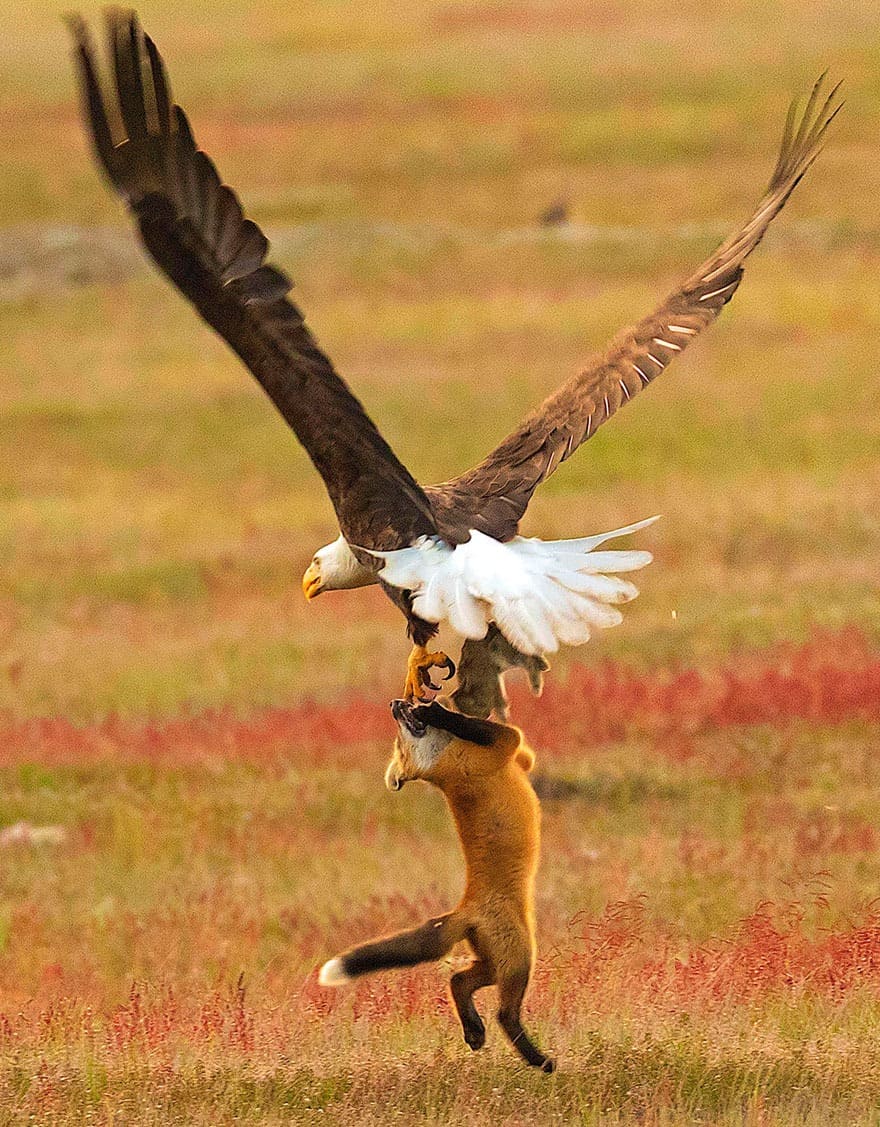 Image source: Kevin Ebi
Image source: Kevin Ebi
 Image source: Kevin Ebi
Image source: Kevin Ebi
In the end, the eagle moved the rabbit to its other claw, causing the fox to let go. The intense battle came to an end in less than 10 seconds.
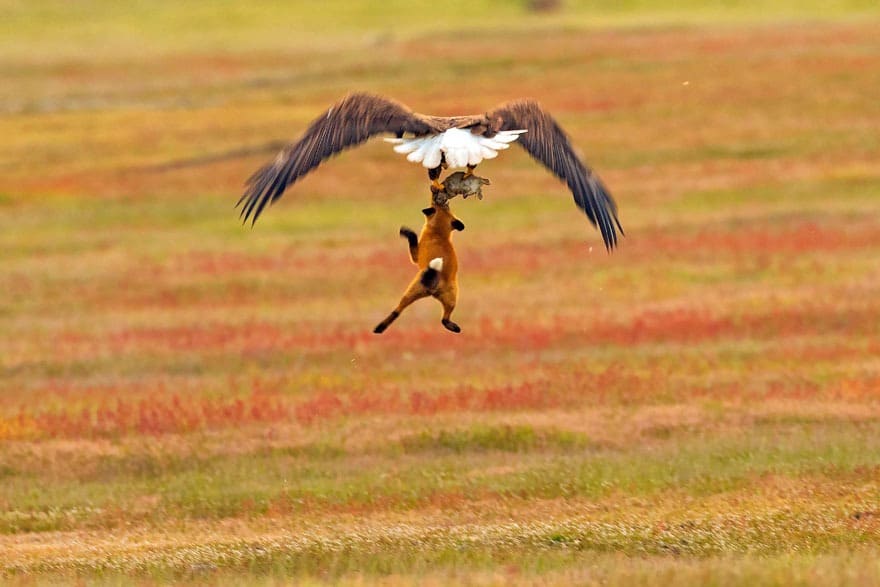 Image source: Kevin Ebi
Image source: Kevin Ebi
For those worried about the fox’s well-being after the fight, Ebi reassures that it was not injured. The fox swiftly bounced back from the encounter and resumed its playful behavior with the other young foxes, showing no visible wounds from the aerial clash.
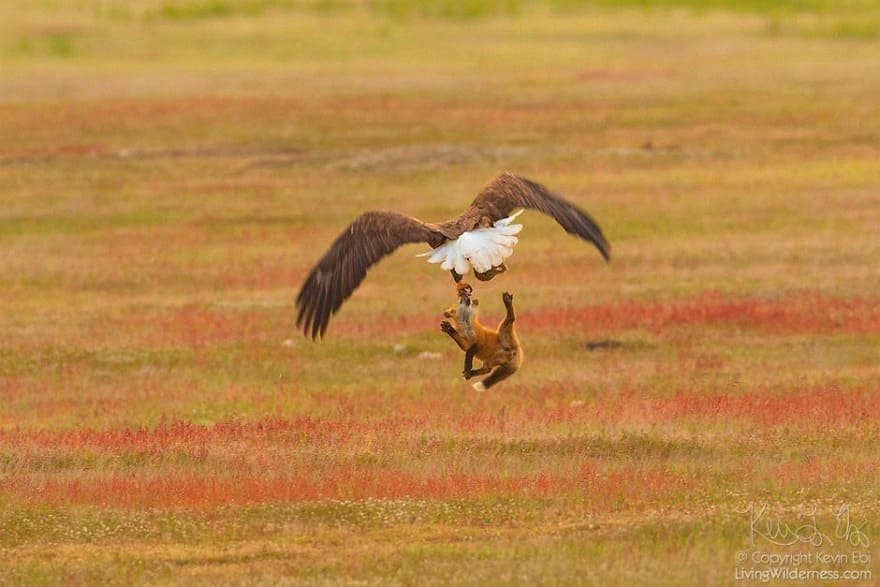 Image source: Kevin Ebi
Image source: Kevin Ebi
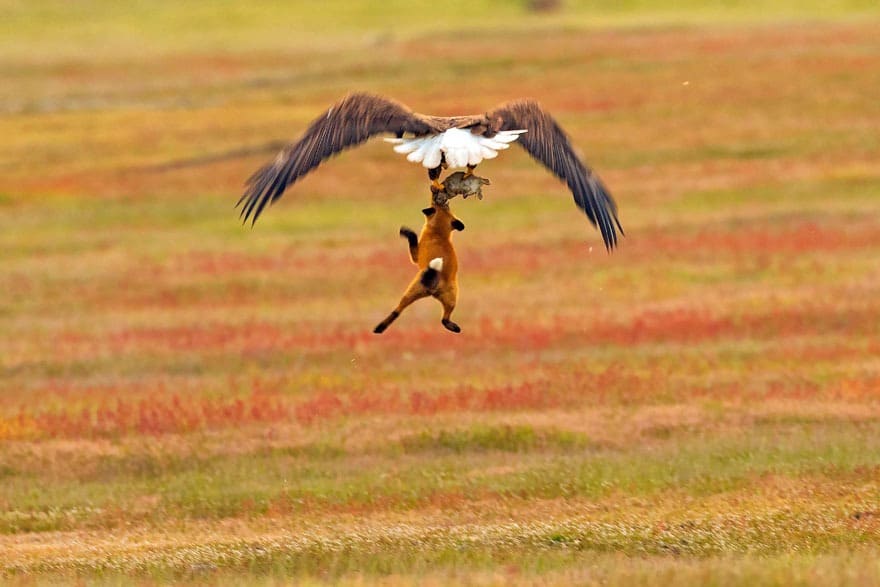 Image source: Kevin Ebi
Image source: Kevin Ebi
 Image source: Kevin Ebi
Image source: Kevin Ebi
 Image source: Kevin Ebi
Image source: Kevin Ebi
-

 GARDEN10 tháng ago
GARDEN10 tháng ago4 Easiest Ways to Get Free Plants
-

 ANIMALS10 tháng ago
ANIMALS10 tháng agoBritish Angler Caught Huge 67-Pound Goldfish in the World
-

 FUNNY10 tháng ago
FUNNY10 tháng ago30 Funny and Perplexing Photos That Make You Laugh All Day
-

 GARDEN9 tháng ago
GARDEN9 tháng ago30 Shimmering Side Yard Landscape Ideas
-

 FUNNY10 tháng ago
FUNNY10 tháng ago30 Weirdest Things That People Came Across On The Subway
-

 DIY & CRAFT10 tháng ago
DIY & CRAFT10 tháng ago19 Easy and Creative DIY Ideas to Enhance Front Yard
-

 ANIMALS10 tháng ago
ANIMALS10 tháng agoKindhearted Driver Rescues Skinny Dog Hiding Near Highway Thanks to His Eagle Eye
-

 FUNNY10 tháng ago
FUNNY10 tháng ago22 Design Fails That Will Make You Laugh Out Loud





